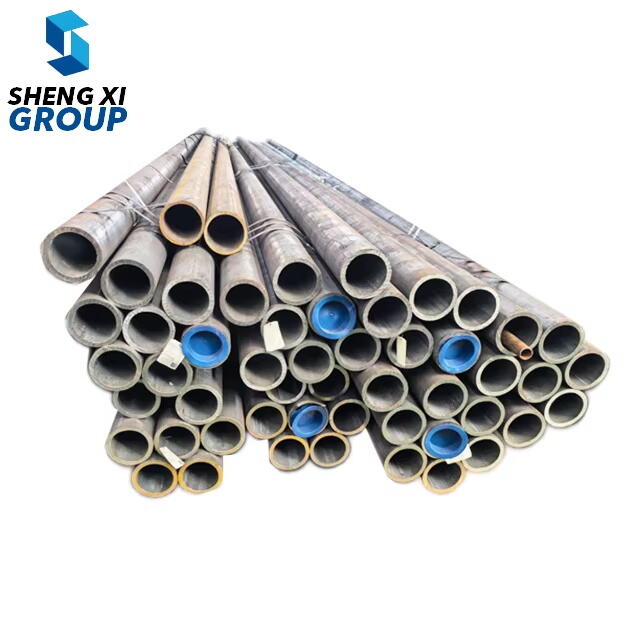Introduction: Why Choosing the Right Alloy Steel Pipe Matters
Picking out the correct alloy steel pipe matters a lot for industries dependent on piping systems. These special pipes find their way into places such as oil rigs, power plants, and chemical factories where regular materials just won't cut it. What makes alloy steel so valuable? Well, it handles tough situations pretty well - think intense pressures, scorching heat, and chemicals eating away at surfaces. Without proper alloy steel, many industrial operations would simply fail over time or worse, pose serious safety risks. When companies select the wrong type of alloy steel, they often end up dealing with costly repairs down the road. Getting familiar with different alloy compositions and knowing what works best for specific applications isn't just good practice; it's actually smart business that saves money in the long run while keeping workers safe.
The Critical Role of Alloy Steel Pipes in Industrial Applications
Alloy steel pipes matter a lot across different industries like oil and gas, power generation, and chemical processing plants. What makes these pipes stand out is their ability to hold up under intense pressure and heat situations, something that keeps systems safe and structures intact over time. Take the oil and gas sector for example. Refineries and drilling sites rely heavily on these pipes because they get exposed to really harsh conditions day after day. Power stations need them too since they transport scalding steam and superheated gases through complex networks. And then there's chemical processing where these pipes actually come into contact with stuff that would eat through regular materials. Getting the alloy selection right isn't just about picking any old pipe. The wrong choice can lead to all sorts of problems down the road. A good alloy match means better performance from day one, longer service life before replacement becomes necessary, and overall smoother operations without unexpected breakdowns messing up production schedules.
Consequences of Poor Material Selection
Choosing the wrong materials often leads to big problems and money spent fixing them later. If an incorrect alloy steel gets picked for piping systems, we've seen everything from small leaks all the way to full blown explosions in some cases. That's why following proper standards matters so much, along with getting input from people who actually know what they're doing. When materials fail, plants shut down while repairs happen, there are fines for safety issues, and worst case scenario someone gets hurt. Industry reports show around 30% of equipment breakdowns come down to bad material picks. For companies wanting to keep running without constant interruptions, investing time upfront on picking the right alloy steels makes sense both financially and operationally speaking.
Understand Application Needs: Pressure, Temperature, and Environment
Assessing Pressure Requirements for Safe Operations
Getting a good grasp on what kind of pressure an application requires forms the basis for running things safely. Industrial processes all have their own pressure needs, and failing to meet these specs often results in problems like leaks or pipe bursts that bring everything to a grinding halt. Alloy steel piping comes in different pressure classes, so engineers can pick the right fit for their particular setup. When someone actually calculates the max working pressure, they're basically making sure those pipes won't crack under stress during normal operation while still maintaining both safety margins and overall system performance.
Temperature Range and Thermal Stress Considerations
Temperature ranges during operation have a major impact on how alloy steel pipes behave mechanically. When picking out materials for piping systems, understanding these temperature limits becomes pretty important for performance in changing conditions. Higher temps mean more thermal expansion happens naturally, which can create problems like warping or stress fractures unless engineers account for it properly in their designs. For installations where heat resistance matters most, going with alloys specifically formulated to handle extreme temperatures makes all the difference. These specialized compositions help maintain structural integrity even when things get hot, keeping industrial processes running smoothly without safety risks down the line.
Environmental Factors: Corrosion and Wear Resistance
Humidity levels, chemicals in the air or water, and temperature changes all play major roles in how long alloy steel pipes last and how well they perform over time. When engineers know what kind of environment these pipes face daily, they can figure out exactly what level of protection against rust and wear is needed. Some special alloys are built specifically to stand up better against corrosion problems, which means these pipes tend to last much longer before needing repairs or replacement. This translates directly to lower maintenance expenses down the road while keeping operations running smoothly year after year. For anyone dealing with industrial piping systems, picking the right type of alloy steel based on local environmental conditions remains absolutely essential for preserving both structural strength and overall system performance across different settings.
Know the Alloy Types: Grades and Their Properties
Low-Alloy vs. High-Alloy Steel Pipes: Key Differences
Knowing the difference between low alloy and high alloy steel pipes matters when picking materials for industrial work. Low alloy pipes have only small amounts of added metals, so they're cheaper but don't hold up well in tough situations. They work fine for regular stuff but tend to fail when faced with intense heat or pressure. High alloy steels tell a different story though. These contain much more of those special elements that give them strength against harsh conditions. Of course, this comes at a price tag that's significantly higher than their low alloy counterparts. For anyone dealing with serious industrial challenges, getting familiar with how these compositions affect performance becomes really important for choosing what works best for particular jobs on site.
Common Grades: P5, P9, P11, and P91
Getting to know the standard grades like P5, P9, P11, and P91 makes all the difference when choosing alloy steel pipes for particular jobs. These different grades have been developed with specific benefits in mind. Take P5 for example it stands out because of its strong resistance to high temperatures, which explains why it works so well in tough environments such as power plants. Real world testing and established industry specs show exactly how each grade holds up against different operating conditions, helping determine where they fit best within various industries. When professionals understand what each grade brings to the table, they're much better positioned to select materials that actually work for whatever project needs them.
Specialized Alloys for Extreme Conditions
When dealing with situations that demand extra protection against heat, rust, or abrasion, specialized metal alloys become absolutely essential. Many of these special metals contain lots of chromium and nickel, which helps them hold up much better in harsh situations compared to regular materials. Take stainless steel for example it works great in places where moisture and chemicals are constantly attacking metal surfaces. On the other hand, alloys packed with chromium really stand out in super hot environments like furnaces or exhaust systems. Getting the right alloy mix makes all the difference for machinery operating under tough conditions. Standard materials just don't cut it anymore when equipment needs to last through years of exposure to extreme factors that would quickly break down ordinary components.
Check Industry Standards: ASTM, ASME, and ISO Certifications
ASTM Standards for Material Composition
ASTM establishes specifications for what goes into making alloy steel pipes, which helps keep things consistent and reliable throughout manufacturing processes. When companies follow these ASTM standards, they're basically promising their products hit minimum safety requirements and quality levels that matter a lot in fields like building infrastructure or oil refining operations. Keeping up with how these standards change over time matters beyond just following rules. For pipe makers and those supplying materials, staying current with ASTM updates often means the difference between staying relevant in business versus falling behind competitors who adapt faster to new industry expectations.
ASME Compliance for Pressure Applications
ASME sets the rules for how alloy steel pipes should be designed, made, and tested when they're going to handle pressure. Compliance with these standards matters a lot, particularly in industries such as oil and gas where accidents can have serious consequences. Following ASME guidelines helps companies avoid lawsuits down the road while also building trust with clients and partners who want to know their equipment meets rigorous safety criteria. The oil field operators I've spoken to all stress that sticking to ASME specs isn't just good practice it's basically table stakes nowadays. Without proper adherence, plants risk everything from production shutdowns to major safety incidents that could cost millions in damages and lost business opportunities.
ISO Certification and Global Quality Assurance
Getting ISO certified shows that a company really cares about quality and reliability, factors that matter a lot in today's global markets. When manufacturers get this certification for alloy steel pipes, they're basically saying these products meet all the international safety and performance requirements. That opens doors to new markets around the world. Companies looking to stand out from competitors often find that spending money on ISO certification pays off in several ways. Operations tend to run smoother, and the brand gains more visibility in the marketplace. Aligning with those worldwide quality standards helps protect against future problems while showing customers that the company stands behind its products as top quality items worth trusting.
Evaluate Quality and Supplier Reliability
Non-Destructive Testing Methods (NDT)
Testing methods that don't damage materials are essential when checking the quality of alloy steel pipes. The industry relies on things like ultrasonic tests and radiography to spot problems both inside and on the surface of these pipes. Ultrasonic testing works great for finding those hidden flaws beneath the surface, whereas radiographic techniques give clear pictures of what's going on both outside and within the material. When companies actually stick to regular testing schedules using these non-destructive approaches, they cut down on failures substantially. This makes all the difference in places where pipe failures could cause major safety issues or expensive downtime.
Material Traceability and Documentation
Material traceability plays a critical role in keeping quality and safety standards intact for alloy steel piping systems. When companies keep detailed records about where their pipes come from and what happened to them during production, it builds trust between suppliers and customers. Plus, many regulatory agencies actually require this kind of documentation these days. Good paper trail means everyone knows exactly what they're getting, and can confirm those materials meet all the required specs like ASTM or API standards. For businesses operating in tight regulation environments like offshore drilling platforms or refineries, having this information isn't just good business sense anymore it's pretty much mandatory for staying compliant with industry regulations.
Supplier Reputation and Industry Expertise
Working with trustworthy suppliers makes all the difference when it comes to getting good quality alloy steel pipes. These folks who've been around the block know their stuff about industry standards inside out. They can actually deliver products that fit exactly what different industries need. And let's face it, nobody wants headaches from bad materials. That's why companies with solid reputations tend to have fewer problems down the road. When businesses partner up with these kinds of suppliers, they're basically setting themselves up for success. The pipes meet quality standards for sure, but there's something else going on too. Projects run smoother overall because everyone knows what they're doing from start to finish.
FAQ
What industries use alloy steel pipes?
Alloy steel pipes are predominantly used in industries such as oil and gas, power generation, and chemical processing due to their ability to withstand high pressure, temperature, and corrosive environments.
Why is the selection of alloy steel pipes crucial?
The selection is crucial because the right alloy ensures the piping system can meet demands of pressure, temperature, and environmental challenges, enhancing reliability and preventing failures.
What are ASTM and ASME standards?
ASTM provides guidelines for material composition, while ASME offers standards for designing and testing in pressure applications, both aiming to ensure safety and quality in industrial equipment.


